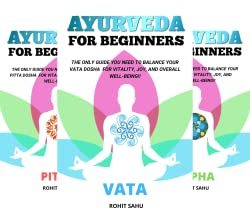Ayurveda For Beginners: Vata
Ayurveda, which derives from ancient Vedic scriptures, is a 5,000 year-old medical ideology and philosophy based on the idea that we are all made up of different types of energy.
There are three Doshas in Ayurveda that describe the dominant state of mind/body: Vata, Pitta, and Kapha. While all three are present in everyone, Ayurveda suggests that we each have a dominant Dosha that is unwavering from birth, and ideally an equal (though often fluctuating) balance between the other two. If Doshas are balanced, we are healthy; when they are unbalanced, we develop a disorder commonly expressed by skin problems, impaired nutrition, insomnia, irritability, and anxiety.
Vata, Pitta, and Kapha are all important to our biology in some way, so no one is greater than, or superior to, any other. Each has a very specific set of basic functions to perform in the body.
That said, when the Doshas are out of control, our wellbeing can be damaged. However, before we get into the particulars of each of the three Doshas, it is helpful to understand their basic nature and their wider function in the natural world.
Throughout Ayurveda, the most basic building blocks in the material world are the five elements: space, air, fire, water, and earth.
Vata is characterized by the mobile nature of Air (Wind) energy.
Pitta embodies the transformative nature of Fire energy.
And Kapha reflects the binding nature of Water energy.
I’ve made a complete series on these three, one for each. This is The Vata; the other two are also available.
Because Pitta and Kapha cannot pass without it, Vata is assumed to be the chief of the three Ayurvedic Standards in the body. It is therefore really important to keep Vata in a good balance.
What's The Meaning of Vata?
Vata is the invisible force of movement — composed of space and air. This controls breathing, blinking, contraction of muscle and tissue, pulsation of the heart, and all movements of the cytoplasm and cell membranes. Vata encourages innovation, creativity, and versatility in a balanced way. But it also causes fear and anxiety when out of control.
Vata reflects the energy of motion and is therefore always associated with the wind (and the element of the air). Vata is related to creativity and flexibility; It controls all movements — the rhythm of the breath, the pulsation of the heart, all muscle contractions, tissue motions, cell mobility — and coordination across the mind and the nervous system.
Physical:
· Constipation
· Disturbed or lack of sleep
· Sensitiveness to cold and desire for warmth
· Dry and rough skin
· Roughness, especially skin and lips
· Pains and general body-ache
· Astringent taste in the mouth
· Tremors and twitches
· Feeling dizzy or spaced out
· Gas formation or distension in the abdomen
· Dehydration
· Loss of strength, fatigue, low vitality
Behavioral:
· Irrational, Anxious, Nervous, Agitated, Impatient
· Excessive movement: anxiety, fidgeting, agitation, muscle twitching, palpitations
· Wanting to run away
· Feeling confused, fearful & shaky
· Feeling ungrounded
Vata Dosha controls the rhythm and motion of the body. Answer these questions to see if you're going to have to balance Vata.
1. Is your skin dry, rugged, and thin?
2. Are you underweight?
3. Is your mind always in a whirl?
4. Do you stress incessantly?
5. Are you constantly irritated or restless?
6. Do you have constipation?
7. Do you have insomnia?
8. Do you have vaginal dryness?
9. Have you had the symptoms of forgetfulness?
10. 10. Do you have pain in the joints?
11. Are you tired easily?
If you answered yes to most of these questions, you have to balance Vata.
2. Avoid Tastes That Increase and Decrease Vata
3. Go For Oil Massage (Abhyanga)
4. Take Account of Your Diet
5. Take Herbal Support
6. Implant Healthy Lifestyle Habits
Tastes That Pacify Vata
Salty
-It is mainly composed of elements of water and fire that make it heavy, oily, moist, and warm.
-Aids the appetite, metabolism, absorption, assimilation, elimination, and is also anti-flatulent.
-It nourishes and promotes growth, muscle strength, and flexibility.
-It helps to cultivate courage and respect and can therefore counter Vata's tendency to fear.
-It is antispasmodic and has an affinity for the nervous system, where many Vata imbalances occur.
-It moisturizes the body and helps maintain the balance of the electrolyte water, which is easily disrupted by excess Vata.
-Its energy moves downwards and stabilizes the Vata.
-The salty taste is almost uniquely derived from the salt itself, but favoring the salty taste does not mean that your food should taste like it was cured.
-Salt is already over-emphasized in the typical Western diet, so simply being mindful of tasty flavors and ensuring that your food has some salt in it is likely to be sufficient.
-Ayurveda recommends high-quality sea salt or natural mineral salt over common table salt.
-Salt stimulates appetite and digestion, helps maintain moisture, promotes proper elimination, and improves the flavor of many foods.
Precaution:
The salt taste should be minimized in cases of water retention, ulcers, hypertension, aggravated blood, or excess Pitta—unbalances that may not be associated with Vata but may still be present in people with Vata constitutions or imbalances.
Reduce:
Pungent
-Pungent is a hot, spicy flavor found in chilies. Radishes, turnips, raw onions and many, particularly are heating spices.
-It is mainly composed of fire and air elements that make it hot, dry, light, and sharp.
-It's extremely drying.
-It is exceptionally stimulating and can cause tremor, insomnia, and pain in the muscles.
-Reproductive tissues may be depleted.
-Vata imbalances such as mental confusion, dizziness, fainting, excess thirst, malaise, fatigue, emaciation, and constipation may be exacerbated.
-It can amplify Vata's high level of excitement, clarity, and expansiveness, which can lead to exhaustion, burnout, idleness, or dizziness.
-It’s upward moving and lightening energy tends to destabilize the Vata.
-However, in moderation, the majority of mild spices are quite Vata-pacifying. Be warned, though, as too much of it can be drying and actually disturb Vata.
-The pungent taste is hot, dry, and light; too much of it is extremely dry to the body, exacerbates the rough consistency, and can therefore annoy Vata.
Bitter
-This is the taste that comes in the form of bitter greens (such as kale, dandelion greens, collard greens, etc.) or foods such as bitter melon, Jerusalem artichokes, burdock root, eggplant, and chocolate.
-It is mainly composed of elements of air and ether (the same elements that predominate in Vata) and is very cold, light, and dry.
-It amplifies Vata's tendency towards extreme cold.
-Dries the muscles and tissues, and removes fluids from the body.
-It tends to scrape and deplete.
-It may worsen Vata disorders such as dry mouth, emaciation, fatigue, constipation, bone loss, sexual impairment, and depleted Ojas.
-Confusion, dizziness, nausea, and discomfort may be triggered.
-Vata's tendency towards feelings of boredom, separation, isolation, and loneliness may be exacerbated.
-As it is cooling, rough, drying and light, the bitter taste will further aggravate this Dosha in you.
-The bitter taste is cooling, raw, rough, drying, light, and usually lowering or catabolic— all qualities that aim to aggravate Vata.
Astringent
-This flavor has a gritty, dry feeling in the mouth–picture sipping a strong black coffee. This is also why it elevates Vata.
-It is mainly composed of elements of air and earth
-It is dry, cold and heavy (making it particularly sensitive to Vata's delicate digestion)
-It has a specific affinity to the colon — the seat of Vata — and its qualities are inherently Vata-provoking.
-This continues to scratch and deplete.
-Vata conditions such as gas, bloating, constipation, dry mouth, speech difficulties, stiffness, spasms, emaciation, insomnia, and sexual weakness may be exacerbated.
-Physical and emotional constriction can be caused, contributing to stagnation.
-Vata's tendency to feel scattered and disorganized or even fearful, anxious, and nervous may be exacerbated.
-The astringent taste is found in legumes (such as beans and lentils), fruit (including cranberries, pomegranates, pears, and dried fruit), vegetables (such as broccoli, cauliflower, artichoke, asparagus, and turnip), grains (such as rye, buckwheat, and quinoa), spices and herbs (including turmeric and marjoram), coffee and tea.
-The astringent taste is essentially a dry taste — a chalky taste that dries the mouth and may cause it to contract. For example, it's the taste you get while you're eating a green raw banana.
-Legumes are classically astringent of taste — adzuki beans, black beans, black-eyed peas, chickpeas, pinto beans, soybeans, and so on.
-The astringent flavor is dry, cold, heavy, and rugged in nature, making it understandably aggravating to Vata.
• Seek to get to bed by 10 pm, wake up by 6 am and eat your meals on a regular basis.
• Avoid getting chilled: Wear appropriate clothes for the season and keep your head covered when the weather is cold.
• Avoid cold food & beverages and go to warmth.
• Drink room temperature water instead of cold or ice water and drinks.
• Add flavor nourishing food to light food.
• Prefer smooth over rough also helps to tackle the problem of Vata imbalance.
• Prefer moist over oily and dry food is the best way to keep your Vata healthy & solid.
• Say no to raw or undercooked food if you are looking for a definite answer to the question of how to balance Vata Dosha.
• Vata types find it very difficult to sustain daily routines, such as eating and sleeping consistently. But this is the most important thing they have to do. When Vata is out of sync, it may seem nearly impossible, but an effort to establish a regular routine is very necessary for all people with a Vata body type.
• Regular workouts should be relaxed and mild. Regular exercise in a meditative mood is healthy, as are yoga, chi gong, tai chi, walking, biking, hiking, and swimming. Avoid tough, stressful, and chaotic practices. Associate, if possible, with those who are relaxed and purposeful. Meditate for deep relaxation every day.
 Enable GingerCannot connect to Ginger Check your internet connection
Enable GingerCannot connect to Ginger Check your internet connectionor reload the browserDisable in this text fieldEditEdit in GingerEdit in Ginger×Enable GingerCannot connect to Ginger Check your internet connection
or reload the browserDisable in this text fieldEditEdit in GingerEdit in Ginger×



